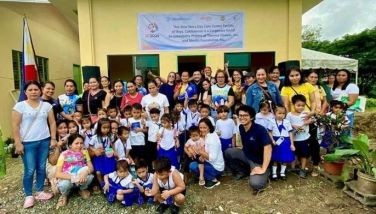The curriculum
It is time to talk about what subjects to include in the two years that DepEd will add to the basic education cycle. As Secretary Armin Luistro correctly says, it is not simply a question of adding subjects. The whole curriculum has been redesigned so that there will be a smooth flow of learning and teaching from Grade 1 to Grade 12. (We really should start calling the high school years “Grades” in order to emphasize that the high school years do not represent a break from elementary school in the continuum of education.)
In the Curriculum Summit that I convened last July 15, the participants listed the subjects that they thought each student should have studied before they graduate from high school. These subjects were of two kinds: those that colleges and universities expect their incoming freshmen to already know before admission and those that students should know if they start working after high school.
Here are the subjects most mentioned by the participants.
Most mentioned was Mathematics. The particular subjects suggested varied from basic mathematics (Arithmetic) to Advanced Algebra, Differential Calculus, and Integral Calculus. In the current 10-year curriculum, most students (except those in science high schools and some private schools) get only as far as Intermediate Algebra, Geometry, Trigonometry, and Statistics and, if they choose them as electives, Advanced Algebra and Business Mathematics. With the extra two years, it should be possible to include Calculus, which is taught in high school in other countries.
Mathematics is necessary not because all students will go into science or engineering courses, but because it teaches analytical skills. Mentioned as also good for honing analytical skills are Philosophy and Logic, although Mathematics wins hands-down as the subject educators want students to master before leaving high school.
Science came in second as the subject all basic education graduates should have. To the participants, Science is not the science now taught in public schools, but real science – experiment-based, inquiry-based, research-intensive. The science subject most mentioned was Chemistry, particularly Inorganic Chemistry.
Part of Science is the study of the human body, variously mentioned as health education, reproductive health, and responsible parenthood. Unfortunately caricatured in media as Sex Education, a combined Anatomy and Physiology course was mentioned as crucial to the education of the youth.
Incidentally, DepEd can shortcut the process of designing a Mathematics and Science curriculum by consulting the National Institute for Science and Mathematics Education Development (NISMED), based in the University of the Philippines. NISMED has been working on mathematics and science learning competencies for the longest time.
Culture came in third in the list of favorites of the participants. Defined primarily as Philippine culture, arts, and heritage, this subject was also expected to deal with the heritage of the ASEAN region. In this case also, DepEd will have an easy time figuring out how to teach culture across the curriculum, i.e., from Pre-school to Grade 12. All DepEd has to do is to ask the National Commission for Culture and the Arts (NCCA) for the ready-made arts curriculum done by the Philippine Cultural Education Program (PCEP). PCEP spent several years designing the curriculum with the help of DepEd itself, as well as various other stakeholders.
Coming in fourth among the most mentioned subjects needed by our youth is Entrepreneurship. This is understandable, because livelihood capacity is one of the objectives of all education. Once we add two years to basic education, a high school graduate will be 18 years old and, therefore, already qualified to work. It is important that the graduate knows how to be a good employee, but since business corporations cannot absorb all our graduates, each graduate must also know how to set up a business. Whether one is on one’s own or in a company, however, entrepreneurship is a skill that will serve a high school graduate well.
Among the other subjects mentioned by the participants were civics, English, environmental education, Filipino, financial literacy, foreign languages (especially Spanish and ASEAN languages), geography, IT, media literacy, Philippine history, Southeast Asian history, values, and vocational-technical skills.
Since some of the subjects mentioned form part of the General Education Curriculum (GEC) in college, it is clear that the college curriculum has to be modified. Most of the participants felt that the GEC should be improved but not eliminated. Most felt that there should be only one year of GEC subjects (compared to almost two years now), but not necessarily all in freshman year. (To be continued)
TEACHING TIP OF THE WEEK – Here’s a teaching tip from the University of California at Berkeley for professors that use the lecture method in their college classes:
“Ask students to spend the last five minutes of class writing down one question they have as a result of the lecture. Answer the questions at the beginning of the next class.”
ERRATUM: In last week’s column, I said that the Curriculum Summit was held in November rather than July. I must have been subconsciously looking forward to the Christmas holidays! Since the “ber” months are almost upon us, it was not an unreasonable wish, but it did make me inaccurate. I apologize for the mistake.
- Latest





























